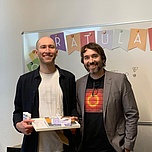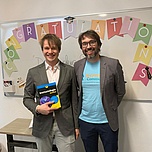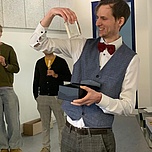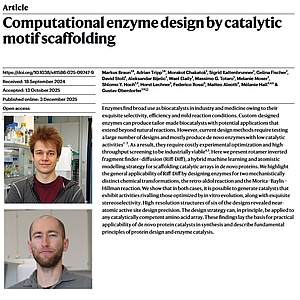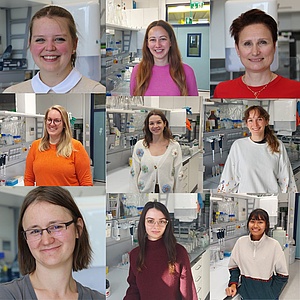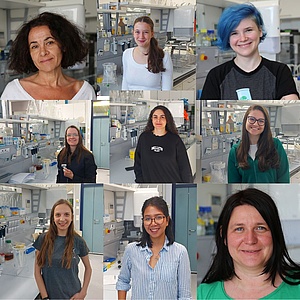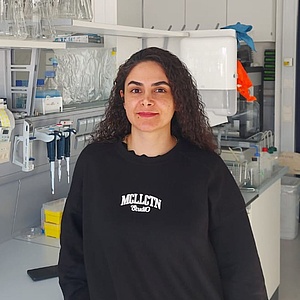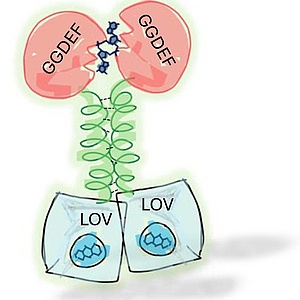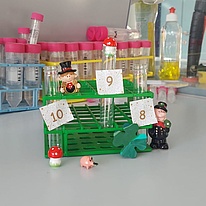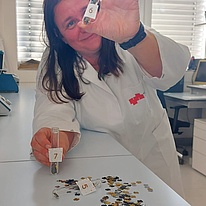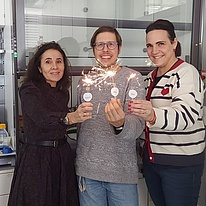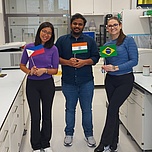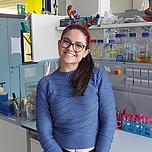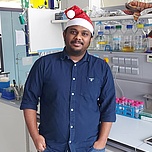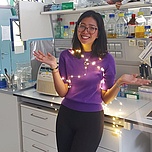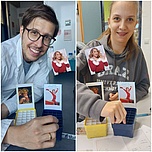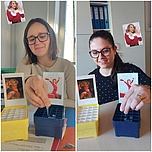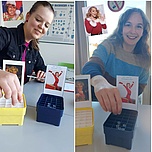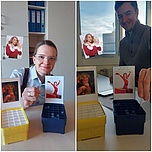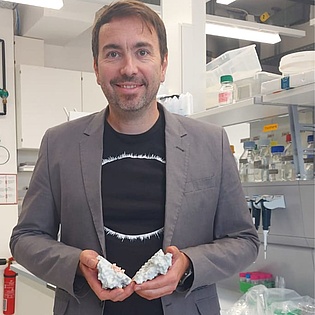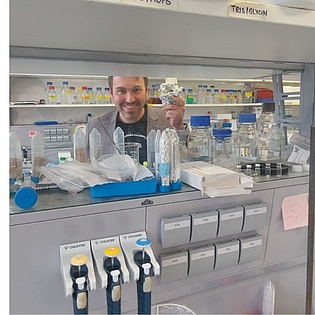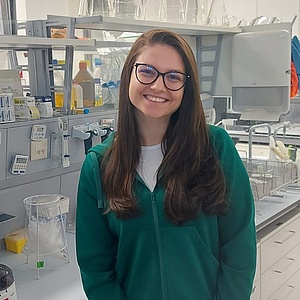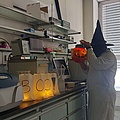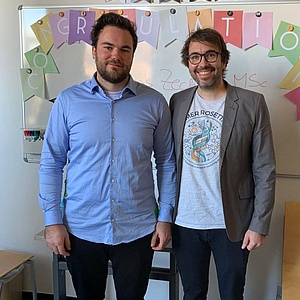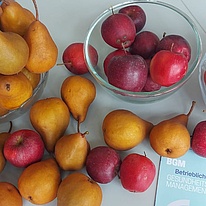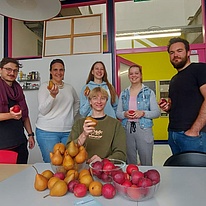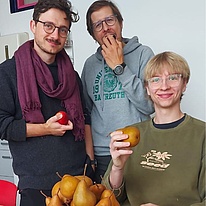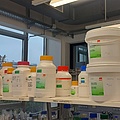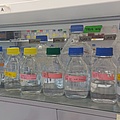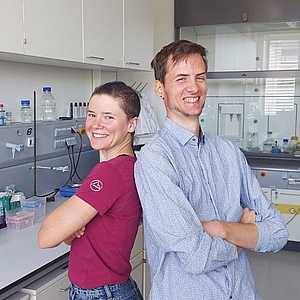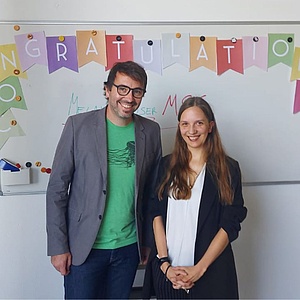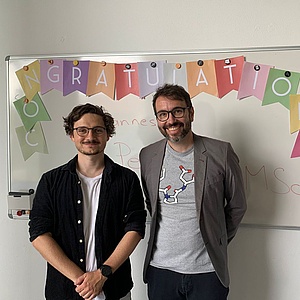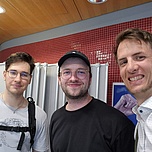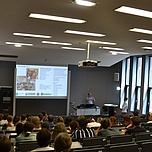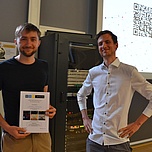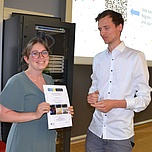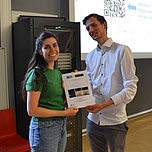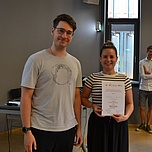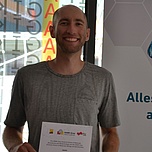Welcome at the Institute of Biochemistry

The Institute of Biochemistry at the Graz University of Technology focuses on basic research questions in the field of protein biochemistry and is tightly connected to local groups addressing questions in protein structural analyses, protein technologies and biocatalysis. The institutes mission is to understand biological processes at the molecular level using an integrative structure-function analysis approach. Currently, emphasis is put on three major research areas: mechanisms of enzyme function in biosynthetic pathways, computational protein design and allosteric regulation mechanisms in sensor-effector systems.
28.02.2026
All good things come in threes!
This week, three of our University Project Assistants successfully passed their Rigorosum — congratulations to Adrian, Markus, and Oliver!
After years of dedication, experiments, discussions, troubleshooting, and scientific curiosity, they have reached this important milestone — and we couldn’t be prouder.
Adrian is heading off to an exciting new position in Grenoble — we wish him all the very best for this next adventure, both professionally and personally!
Markus and Oliver will continue their scientific journey right here at our Institute of Biochemistry — and we’re delighted that they are staying on to start the next chapter of their careers with us.
Science thrives on passion, perseverance, and teamwork — and this trio has demonstrated all three.
Congratulations again on this fantastic achievement. The future looks bright!
15.02.2026
Exciting News from the Institute of Biochemistry!
A huge congratulations to our colleagues on the publication of their groundbreaking study in Nature:
Braun, Tripp et al., “Computational enzyme design by catalytic motif scaffolding” (Nature 649, 237–245, 2026)
Here are three fun facts to kick things off:
Did you know…
- …that the team developed a new computational pipeline called Riff-Diff that can design enzymes from scratch around specified catalytic motifs? This hybrid machine-learning and atomistic modelling strategy greatly improves how precisely catalytic residues are placed in the active site — a key factor for efficient catalysis.
- …that using this approach, they created de novo enzymes that catalyse chemical reactions with activities rivalling those achieved by extensive directed evolution? For example, some designed retro-aldolases showed millions-fold rate enhancements compared to the uncatalysed reaction.
- …that the designed enzymes are not only active but highly stable, with most remaining folded above 90 °C? This makes them promising candidates for practical applications in synthesis and biotechnology.
In summary: This work represents a major advance in computational enzyme design, offering a more general and precise way to create tailored biocatalysts for both natural and non-natural reactions.
Congratulations again to all authors on this fantastic achievement!
12.02.2026
Yesterday was the International Day of Women and Girls in Science.
But science does not happen on just one date in the calendar.
At the Institute of Biochemistry, we witness every day how curiosity, dedication, and scientific excellence drive discovery forward — powered by talented women at every career stage. From students taking their first steps in research to experienced scientists leading innovative projects, their contributions shape our understanding of life at the molecular level.
Science thrives on diversity. Different perspectives spark better questions, deeper insights, and stronger solutions. Supporting women and girls in science is not a one-day commitment — it is an ongoing responsibility.
Let’s continue to create spaces where talent can grow, ideas can flourish, and the next generation of scientists can see that they belong.
29.01.2026
Meet our visiting researcher, Mahrokh Amini!
Originally from Iran, Mahrokh is a PhD student at the University of Isfahan, a city known for its rich history and long-standing role as a center of science and culture. With extensive prior experience in the plastics industry, her research path naturally shifted toward sustainability.
During her stay at TU Graz, Mahrokh has joined Horst Lechner’s research group at the Institute for Biochemistry (IBC), where she works on designing new enzymes for plastic degradation, contributing to more circular material lifecycles.
She greatly values the collaborative atmosphere at IBC and enjoys both the scientific energy and the charm of Graz.
We’re delighted to have her with us!
08.01.2026
New year - new publication!
In a joint effort of the Photobiochemistry group the work of former PhD student Uršula Vide was rounded off with the help of Julia Schwekendiek and Gabriela Shickle.
Read more about their integrative approach to understand molecular details of light activation in blue light regulated diguanylate cyclases.
It's great to start the new year like this!
30.12.2025
Happy New Year from the Institute of Biochemistry!
As the clock strikes midnight, we’re ready to start new reactions, test fresh ideas, and explore unknown pathways.
Here’s to a new year full of curiosity, collaboration, successful experiments (and a few learning moments), and exciting discoveries.
May 2025 be rich in data, low in contamination, and high in positive results!
Happy New Year!
24.12.2025
Christmas Around the World at the Institute of Biochemistry
At our institute, Christmas isn’t just a holiday – it’s a global celebration! With colleagues joining us from all over the world, we asked three of them to share how Christmas is celebrated in their home countries. The result? A beautiful mix of traditions, flavors, and festive spirit.
Maira from Brazil
“In Brazil, we celebrate Christmas with family and plenty of food! Christmas Eve dinner on the 24th is the main celebration, featuring turkey or pork, salad, rice with raisins, potato salad, and lots of desserts. But some families keep it classic and fire up the barbecue with plenty of cold beer – perfect for beating the summer heat!”
Sajith from India
“ Christmas in India has a special magic. In Kerala, it arrives when the weather is pleasant, after the heat and rain have passed, so every gathering feels comfortable. Homes shine with Christmas stars and cribs, and the smell of plum cake fills the air. Carol groups visit houses, singing songs that bring a familiar warmth to the season. Friends and neighbors from all backgrounds share big meals, making Christmas a joyful celebration of light, color, and tradition that brings everyone closer.“
Lyle from the Philippines
“I can't think of any other nation that loves Christmas as much as the Philippines. We have the longest Christmas celebration—starting as soon as the ‘-ber’ months begin! Decorations go up in September and stay until February. December is our busiest month: Christmas caroling, year-end parties, endless shopping, and nine nights of Christmas Novena (‘Simbang gabi’). On Christmas Eve, families gather for Noche Buena, a feast with glazed ham, roasted pork, Filipino spaghetti, lumpia, and fruit salad. The night is loud, joyful, and filled with music, karaoke, and games. But at its heart, Christmas for Filipinos is about family—sharing food, laughter, and the feeling of finally being home.”
However we celebrate and wherever we come from, the spirit of Christmas brings us together. At the Institute of Biochemistry, we’re proud to share not only our science, but also our stories, cultures, and traditions.
Merry Christmas from our international family to yours!
11.12.2025
Holiday Question of the Day at the Institute of Biochemistry!
In the spirit of Christmas and chemistry, we ran a highly sophisticated, perfectly calibrated, absolutely peer-review-worthy experiment in the lab today.
Using two festive pipette-tip boxes, we asked the most important scientific question of the season:
Are you Team “Last Christmas” or Team “All I Want for Christmas Is You”?
Our method?
Every researcher entering the lab had to “pipette their vote” by dropping a tip into one of two boxes.
No statistics software needed — just pure holiday chemistry.
--> Yellow tips = Last Christmas (for the 80s nostalgics)
--> Blue tips = All I Want for Christmas Is You (for the Mariah supremacy crowd)
The results are still coming in… but one thing is clear: Whether you prefer Wham! or Mariah, Christmas hits keep our lab spirits as high as our buffer pH!
19.11.2025
Proteins play a crucial role in every process within our bodies — but what exactly are they?
In this short video, our colleague Gustav Oberdorfer breaks down the basics in a clear and engaging way.
Watch the video to learn more!
06.11.2025
Welcome Maira Gabriela Paetzold!
Originally from Cascavel, Brazil, Maira is a PhD student in Pharmaceutical Sciences at Universidade Estadual de Maringá (UEM). Her research explores chorismate synthase as a potential drug target, aiming to uncover new opportunities for therapeutic development.
At the Institute for Biochemistry, she joins Peter Macheroux’s Protein Biochemistry group, collaborating on studies of fascinating flavoenzymes.
Despite missing her tropical home, Maira says she’s found a wonderful new (and colder!) home here in Graz — and a new family at the institute.
We’re excited to have her with us!
31.10.2025
Spooky reactions in the lab!
This Halloween, our biochemists are brewing more than just coffee — mysterious reactions are bubbling in our flasks! Whether it’s fluorescent proteins glowing eerily under UV light or enzymes doing their magic, science is full of “tricks and treats”.
Happy Halloween from the Institute of Biochemistry, TU Graz!
28.10.2025
Congratulations to our Master's student Andreas Zechner, who has successfully completed his final examination! All of us at the Institute of Biochemistry warmly congratulate him on this great achievement.
His Master's thesis, "Solubilization of Membrane Proteins through AI-guided Protein Design", marks an important milestone in his academic journey — and we’re delighted that Andreas will continue his scientific path with us.
Starting November 1st, he will join our team as a University Project Assistant and begin work on his PhD at the Institute of Biochemistry.
We’re looking forward to continuing our collaboration and wish him every success for the exciting years ahead!
14.10.2025
An apple a day keeps the doctor away!
Thanks to the Workplace Health Management team at TU Graz, we’re once again enjoying the annual Fruit Day! Fresh apples and pears were delivered to all institutes – including ours at the Institute of Biochemistry.
A healthy snack to kickstart the day and a great reminder that well-being begins with small habits.
01.10.2025
A warm welcome to the new academic year 2025/26!
At the Institute of Biochemistry, everything is ready:
- Test tubes polished
- Chemicals prepared
- Lab coats freshly washed
- Lecture hall waiting for you
We are excited to start the winter semester together and wish all our students a successful and inspiring year ahead.
Welcome back – we look forward to seeing you!
23.09.2025
New Publications from our Institute of Biochemistry!
Cornelia Böhm – In collaboration with the groups of Heikki Takala (University of Jyväskylä, Finland) and Andreas Möglich (University of Bayreuth, Germany), Cornelia successfully developed the "pFREDusk" circuit. This innovation enables activation of bacterial gene expression with far-red light, expanding the optogenetic toolbox with a new wavelength.
Read more here.
Oliver Eder – Together with Massimo Totaro, Oliver published the study "Integrating protein sequence design and evolutionary sequence conservation to uncover spectral tuning sites in red-light photoreceptors". Their FSA method combines ProteinMPNN and evolutionary conservation to accelerate the identification of residues that shape protein function – a powerful tool for studying allosterically regulated proteins.
Read more here.
Congratulations to both for pushing the boundaries of biochemical research!
22.09.2025
Congratulations to our student Melanie Moser for successfully completing her Master’s degree!
Her thesis, “Redesign of a de novo homo hexameric protein pore for crystallisation”, marks an impressive achievement and a true milestone in her academic journey.
We are excited that Melanie will continue to be part of our Institute of Biochemistry team as a technician, and we look forward to many more great collaborations ahead.
25.07.2025
02.07.2025
And just like that, the 32nd NAWI Graz DocDay is a wrap!
A heartfelt thank you to all participants for contributing with inspiring talks, creative posters, and lively scientific discussions – all while braving the summer heat!
Special thanks to our guest speakers Sander Grannemann and Allon Hochbaum for offering deep insights into their scientific work and careers.
Congratulations to our award winners:
- Adrian Tripp – Best Talk (Jury), sponsored by Bartelt
- Lucija Sovic – Best Talk (Audience), sponsored by Microsynth Austria
- Nikolina Todorovic, Nadine Egger & Johannes Breithofer – Best Posters (Jury), sponsored by ChemBioChem/Wiley
Huge thanks to the organizing team Kirill Kuhlmann, Maximilian Fuchs, and Oliver Eder, as well as to Kristina Schild and Christine Rother for their incredible support. We also gratefully acknowledge Tea Pavkov-Keller and Harald Pichler for their guidance and encouragement throughout.
Let’s keep the science going – see you all at the next DocDay!
Institute of Biochemistry Petersgasse 12/2, 8010 Graz
Phone: (+43) (0)316 873 6451
E-Mail: office.ibc@tugraz.at

